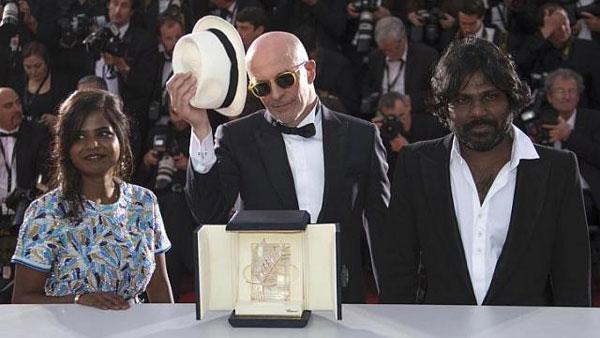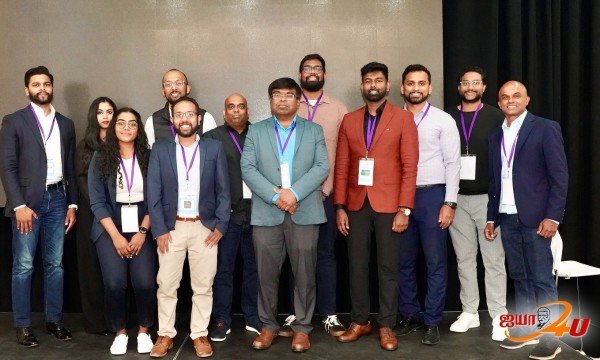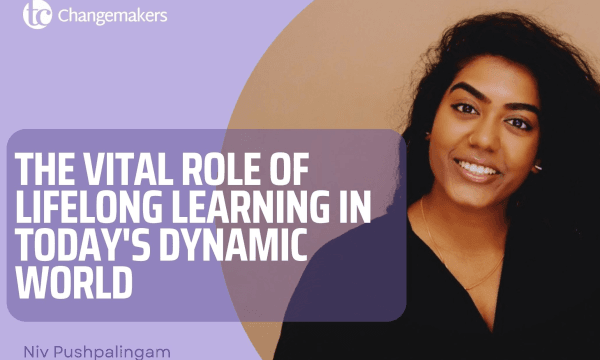
Audiard’s A Prophet, which won the Grand Prix at Cannes, tells the story of an Algerian in France played by Tahar Rahim as he finds his way through a seedy criminal underworld in jail that is divided between Corsicans and Muslims until it all comes crashing together. The film was a success.
In an interview with Cinemotions, Audiard explains why he made this film: “We wanted to create heroes from figures that the public does not know, who have not have iconic representations in cinema, like Arabs for example. In France, films have a tendency to place a scene in a uniquely naturalist or sociological representation. We wanted to make a pure genre film, a little bit like a Western who when placed in the light the faces that we don’t know can be transformed into heroes.”
In an interview with The Film Stage for Dheepan, co-screenwriter Noe Debré, the one that “announced” that he had met some Tamils, repeats the same, almost exact reasons, for making the creating the film: “There’s something very striking for us in Europe, specifically in France, about this subject matter. Ours is a very diverse population.
In Paris you meet a lot of Sri Lankans—no, actually you don’t meet them, you just see them. You have no idea what their stories are. They are not represented in cinema, at least not in French cinema, or even in Western cinema, especially not in genre movies. That’s what made the prospect interesting to me. Immediately you think, there’s going to be pictures that we’ve never seen before.”
Who are these films for? Who is this “we”? White audiences? Since I was a child I’ve been exposed to Tamil cinema (which is usually subtitled in English) and Tamil stories that are filtered through every genre imaginable ad nauseam. Perhaps for Mr. Debré and Mr. Audiard, these are images that they have never seen before. But a very quick, very easy Google search would expose them to more than 200 hundred Tamil films every year telling Tamil stories.
These are images that have seen before. This is not new, revolutionary, or radical. But when Jacques Audiard decides to tackle it, somehow finds 7 million dollars to make it, and puts the brown faces to his camera, he finds himself in Main competition at Cannes, winning the Palme D’Or, and later screening at TIFF.
And you guessed it—for over the past 10 years at Cannes, not one film in Main Competition has been from or directed by someone from India or Sri Lanka, or featured Tamil or Indian actors in main roles. Only one time has India won the Palme D’Or in 1946 for Neecha Nagar (Lowly City). Even Mira Nair and Deepa Mehta have fallen through those cracks. Whose fault is it that brownies and Tamils haven’t been represented in Cinema?
In Toronto, Dheepan is screened at the Toronto International Film Festival and later at the TIFF Lightbox in its theatrical run for a few weeks, then the Regent for another few. In Now Magazine, Radheyan Simonpillai, who gave the film a very favorable review, brings attention to certain issue: “Two weeks before the film’s release, Cineplex auditoriums in Scarborough, Brampton and Mississauga playing the Tamil-Indian action movie Theri were hit with coordinated attacks. According to police, a “noxious substance” similar to pepper spray were released in those auditoriums, forcing Cineplex to evacuate the theatres. Cineplex had to cancel Theri’s run as a precaution against more attacks.”
Last month, this issue escalates when Rajini’s Kabali is said not to run in Cineplex theatres at all. One would just have to look around at what theatres are playing Kabali to explain why I’m not lining up on a Tuesday to watch the movie for $7.99 and instead passing on the $18 it was being charged for.
Simonpillai expresses some personal qualms, “The Tamil community mostly resides in suburban enclaves like Scarborough, Markham, Mississauga and Brampton, and many are allergic to the idea of traveling to the heart of downtown for a movie,” and misses the main problem. There shouldn’t be any need for Tamils to go downtown to watch a movie about them, if it’s for them in the first place, at the Lightbox where their films do not and have not been welcomed before.
Dheepan was made with Tamils, but it wasn’t made for them. It’s been accepted and given stamps of approval in spaces that otherwise neglect and ignore brown voices, brown stories, and brown identity in their main spaces. Yes, Indian and Tamil films have been featured in sidebars or in years where there was a focus on their country—in questionable time-slots and locations—or with a big star making her comeback, but, big gulp, one would have to admit that for an industry that makes over 200 films a year for the most past has been pushed aside unless directed or presented by a white person or non-white production companies (TIFF pats itself on the back for screening Slumdog Millionaire—the film featuring brownies that won Best Picture at the Academy Awards and a whole slew of other awards. I have yet to see a film headed by or including an Indian or Sri Lankan since then, perhaps because a white director hasn’t announced meeting them yet or hasn’t figured out how they dream).
This is an issue of accessibility and access. Cineplex Odeon had no problem benefiting from Tamils in the past, but two isolated incidences have lead to the silencing of our cinema. It’s a cowardly move. A white boy can run to the nearest Cineplex and be raped by the amount of images that reinforce and establish his identity and existence. There is no movie playing at Cineplex that doesn’t feature a representation that he can live up to and identify with. Privately owned businesses are important, even if they only screen digital and thus not providing anything not on the marketplace. But their existence encourages isolation and stands as a form of segregation. Your movies play here in this small theatre for $18 a ticket, and everyone else can have their stories and options exist in the same place and enjoy Tuesdays.
This is not a call to be accepted and reaffirmed by mainstream culture, but to have the opportunity to exist in the same place alongside other types of cinema, in the history of cinema. I want to walk into a Cineplex Odeon and watch a Tamil movie with other people, because there is a huge Tamil community that is also interested in doing the same thing to witness representations of ourselves. The Tamil community who brought sold-out shows and represent a market that needs to be addressed, not ignored.
You can play Suicide Squad on multiple screens and can’t play one Tamil movie alongside? Does the color of our skin diminish your own? The reason Dheepan played downtown is that it was meant for the metropolis, downtown white people who tell their friends of that movie about Sri Lankans that won the Palme D’Or that was so good—not the suburban immigrants that drive your Uber.
For Cineplex to stop screening Tamil films and not provide a sufficient statement afterwards sends a clear message to Tamils—you and your stories are not welcome. You’re too much trouble. There is a magic that happens when you watch a film in the theatres, when you hear your language being spoken, when you can identify and relate to what is happening on screen. And even if you can’t, you laugh along with your family who does—because to them it matters, or else it just seems like we don’t exist.
When Tamils stood in front of the burning Jaffna Library, they must’ve thought we no longer exist. When Draupadhi lies on the floor kicked by Keechaka she must’ve thought, in her disguised state, I no longer exist. When Dheepan looks at the burning pyre in his camouflage army uniform and the flesh burning in front of his eyes, he must’ve thought they no longer exist.
I think back to 1918 when Keechaka Vadham was screened for the first time, and the feelings and faces of the audiences’ members as they watched their fellow Tamils on screen in their own gaze and the beauty of experiencing that singular event. Maybe that’s why Tamils love film and TV so much when living in a white world away from home; we need to constantly be reminded that we exist in our own eyes. We need to constantly speak our names, stories, and consciousnesses so that people don’t think that they have claim to our existence.
We exist.
And we don’t need anyone else to tell us that but ourselves.

























